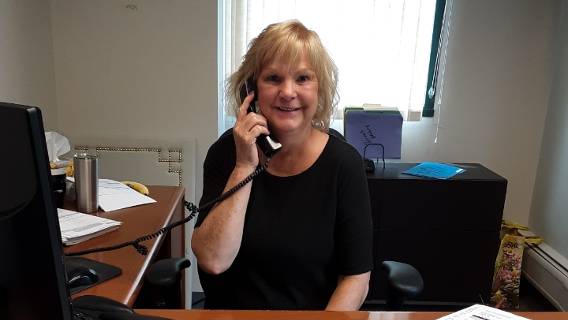Pleural Mesothelioma Survivor Uplifted by Work and Community

Unlike many in the workplace today, Dinah Smith still welcomes that sunrise wake-up call that starts her weekday mornings.
Now, more than ever, it reminds her there is a job to do, people to please, money to make and, most importantly, a good life to live.
Smith is one of the fortunate few, a mesothelioma survivor who returned to the daily routine she knew before her diagnosis, invigorated by a newfound appreciation for good health and good luck in overcoming the odds.
“I like my job. I like going to the office every morning and interacting with others. I think it has really helped me mentally – and physically – as I go through this,” she told The Mesothelioma Center at Asbestos.com. “When I was first diagnosed and had to stay home it was horrible. I was miserable. Now I’m back in the office. And I look forward to it each day.”
Retirement can wait.
Mesothelioma Treatment Working Well
Smith, 64, works full time in the customer service department for a fragrance company, where she has been for more than 30 years. It’s not far from her home in Bloomingdale, N.J., and the community hospital where she was first treated for mesothelioma almost two years ago.
Although the median survival for unresectable pleural mesothelioma, a rare cancer with no cure, is only 12 to 15 months, Smith shows no sign of fading. She doesn’t look – or act – like a cancer patient.
She still works the 8 a.m. to 5 p.m. shift Monday through Friday, climbing the two flights of stairs to her office several times each day. Her lunch break often includes a significant walk. She also loves to shop. That never changed.
“At work I’m putting out fires all the time, but that’s good. It keeps my mind occupied so I don’t have time to worry about my health,” she said. “I think staying active is so important, if you can manage it. I feel very lucky right now to be where I am.”
Smith was treated originally at Chilton Medical Center in early November 2020, receiving a standard-of-care chemotherapy combination that halted mesothelioma growth but had depressing side effects. It kept her home for six months recovering, a period she would like to forget.
Smith is receiving maintenance treatment every three weeks that involves chemotherapy and bevacizumab (Avastin), a drug that stops the formation of blood vessels bringing oxygen and nutrients to the tumor cells.
On those treatment days she leaves work an hour early. The side effects are mild, and she is back at her desk the next morning. Every three months she goes in for a scan. The last one in July – once again – showed no new tumor growth.
“I don’t know what the future holds, but for now, I’m in a good place. Everyone reacts differently to treatment,” she said. “I know I’ve been fortunate. My doctor found something that works for me, so I’m sticking with it. He knows what he’s doing.”
Staying Close to Home for Treatment
Although some have suggested she look for a mesothelioma specialist in New York City 90 minutes away, she has stayed with Dr. Andrew Bernstein, the highly respected associate director of medical oncology at nearby Chilton Hospital. There is a comfort level there, much like going to work every day.
Bernstein had treated her mother, who died less than three months before Smith was first diagnosed with mesothelioma.
Bernstein is known for his work with breast, colon and lung cancers patients. He trained at Mount Sinai Hospital in New York.
“Dinah has handled everything really well, with no sign of disease progression,” Bernstein said. “And being back at work has become a really welcomed distraction for her. In a community like this, you get to know and really care for your patients.”
Smith was fortunate to be diagnosed sooner than many others, almost by accident. As part of a routine colonoscopy, a gastroenterologist heard something unusual in her lungs, setting off a series of tests that eventually led to the diagnosis of mesothelioma.
Survivor Finds Support in Family and Community
As a primary caregiver, Smith was already struggling with the death of her mother and the COVID-19 pandemic that sent everyone home to work, which she disliked.
The mesothelioma diagnosis was shocking because she had no known exposure to asbestos, its primary cause. And she knew nothing about the disease.
“I just thought it was something they could fix. Something you just got rid of. I had no idea it was such an awful, awful disease,” she said. “The more I read about it, the more scared I got. I was in a bad place for quite a while.”
Slowly, though, during the six months at home, Smith found her life brightening. Bernstein helped her mentally as well as physically.
She talked to her minister at church. She talked several times with a counselor at the cancer center, who also happened to live close by. Husband Tom was always where he needed to be to help.
“He still makes me dinner every night,” she laughed.
Smith was awed by the kindness and caring of the staff, both at the hospital and the treatment facility where she is receiving her maintenance drugs. She’s smiling again.
Going back to the office really struck a chord, especially when her scans were coming back with no cancer progression.
“I’m in a good place now. I want others to know you can get through this. You can continue living,” she said. “I pray. I go to church. And I know my mom is looking out for me, too. It’s a hard thing to deal with sometimes, but you can get through it.”